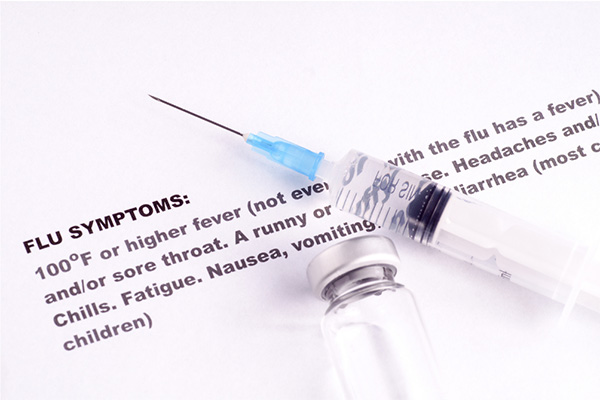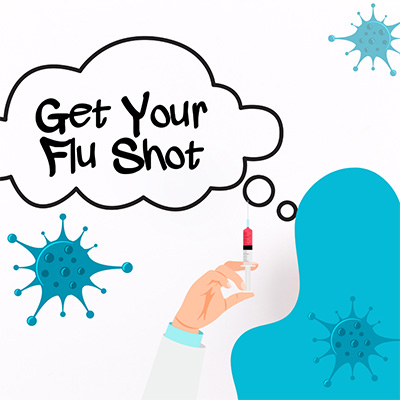With flu cases on the rise, it’s time to consider a flu immunization if you haven’t already. In honor of National Influenza Vaccination Week, we’ve gathered the basic information you need to know when considering this year’s flu shot.
What is the Flu (Influenza)?
According to the Center for Disease Control and Prevention (CDC), “influenza is a contagious respiratory illness caused by influenza viruses that infect the nose, throat, and occasionally the lungs. It can cause mild to severe illness and can lead to death.”
When is Flu Season?
Influenza cases can occur any time of year, but there is a flu season when cases are more likely. In the United States, flu season begins in October and can last until May. Influenza cases usually spike between December or February.
What are Influenza Symptoms?
- Fever or feeling feverish/chills
- Note: You do not have to have a fever to have the flu
- Cough
- Sore throat
- Runny or stuffy nose
- Muscle or body aches
- Headaches
- Fatigue (tiredness)
- Vomiting and diarrhea, though this is more common in children
How Long is Someone Contagious with the Flu?
You can spread the flu to others before knowing you’re sick as well as when you’re sick. People with the flu are most contagious the first 3-4 days after they become symptomatic. Some healthy adults can infect others the day before symptoms appear and can continue to infect others 5-7 days after their symptoms appear.
Young children and people with weakened immune systems are thought to be able to infect others for an even longer period than a healthy adult; this is due to how long it takes their immune system to fight off the illness.
How Does Influenza Spread?
Experts believe the flu virus spreads through droplets of saliva people with the flu emit when coughing, sneezing, or talking. Similar to the way COVID-19 is spread, these droplets can land in the mouths or noses of people nearby and infect them. People can also pick up these droplets by touching a surface with droplets on it.
Is the Flu Preventable?
Yes! In fact, influenza is the only respiratory virus preventable by vaccination. To diminish your risk of getting the flu:
- Get the influenza vaccine
- These are available at little to no-cost at pharmacies (including those in your local grocery store) and your primary care physician’s office.
- You can find flu vaccines near you using this vaccine finder: https://www.vaccines.gov/find-vaccines/
- Wash your hands often
- Are you washing your hands correctly? Check out our blog on proper handwashing here
- Cover your mouth and nose with a tissue when you cough or sneeze
- If you can’t reach a tissue in time, cough/sneeze into your elbow instead
- Don’t touch your face unless you’ve just washed your hands
- Keep your immune system happy
- Exercise regularly and eat well to strengthen your immune system
- If you have the flu, stay at home until your fever is gone for 24 hours without using fever-reducing medicine (such as ibuprofen)
 What are the Benefits of Getting a Flu Shot?
What are the Benefits of Getting a Flu Shot?
The number one benefit of getting the flu shot is that will reduce your risk of getting the flu by 70%. But did you know there are other benefits too?
- Several studies have shown that the flu shot reduces the severity of the flu if you have a breakthrough infection
- The vaccine reduces the risk of flu-association hospitalization
- The vaccine protects you and others, as your risk of carrying the flu has been decreased so dramatically
- This is especially true for children, older adults, those with weakened immune systems, and those who are pregnant
In addition to these benefits, it’s even more important to consider an influenza vaccine if you’re someone who suffers from chronic health conditions (e.g., asthma, cancer, heart disease, HIV/AIDS, diabetes) or are pregnant. The flu virus can cause severe illness in these groups of people, including a higher rate of intensive care unit (ICU) admission, longer duration of illness, and an increased risk of mortality.
Won’t the Flu Vaccine Make Me Sick?
Your yearly flu vaccine will not make you sick. While the vaccine is made with using several strains of influenza viruses, they’re all inactivated, meaning it’s impossible to get the flu from the vaccine.
Your arm may be sore, or you may experience a low-grade fever (99.6°F – 100.3°F) after receiving the vaccine, but these are simply side effects of the vaccine – not the flu. If you’re still not sure if you should get the flu vaccine, the CDC has an online guide on who should and should not receive a flu shot.
Isn’t the Flu Vaccine Just a Guess?
No. The seasonal influenza vaccine is designed using four influenza viruses that researchers have found are most likely to spread and cause illness. Over 144 national influenza centers in over 114 countries conduct “year-round surveillance” for influenza viruses. These are researchers who test thousands of influenza viruses year-round and send results to six World Health Organization (WHO) Collaborating Centers across the world.
Twice a year, the WHO meets with the directors of these six collaborating centers to discuss trends and findings in their research. In these meetings, doctors and medical researchers make suggestions for which strains of influenza should be in the flu shot. These suggestions are presented to the Food and Drug Administration, who makes the final decision about what the vaccine contains.
To read more about the composition of the flu vaccine, check out the CDC’s article “How Flu Vaccines are Made.”
Have More Questions?
For more information on the flu, see the Center for Disease Control and Prevention’s webpage on influenza.
To find a pharmacy giving flu vaccines, use this online vaccine finder.


